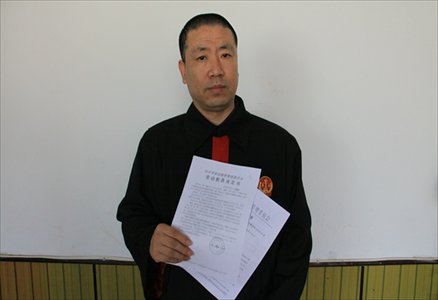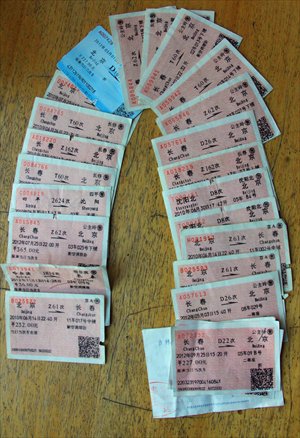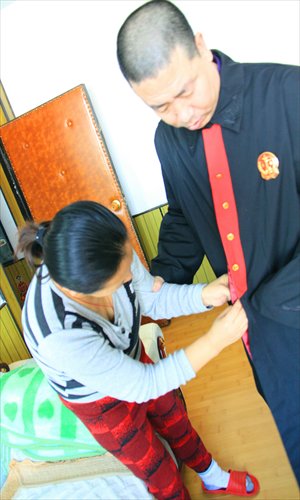From judge to petitioner

Guo Xuehong, in his former judge's robe, displays on November 29, 2012 local police's notice to send him to a reeducation-through-labor camp. Photo: CFP

Train tickets Guo Xuehong bought in 2011 and 2012 for his petition trips between Beijing and Changchun, Jilin Province. Photo: CFP

Guo Xuehong, partially disabled after a stroke in 2011, needs his wife to take care of his daily living. Photo: CFP
"I just want to demand an answer for judges in China," the 48-year-old former judge emphasized the line several times during an interview on the phone, raising his voice. Two years ago, when Guo Xuehong was dismissed from his post as a local court's vice president and resorted to becoming a petitioner, he said he was seeking justice for judges.
Seven years ago, when Guo was elected as the youngest vice president of a court in Northeast China's Jilin Province, he never expected he would lose everything simply for resisting government interference in the courts.
Very few people would have believed that Guo, used to handing down justice to petitioners in court, would become one himself and end up in a reeducation-through-labor camp.
Having suffered a brain aneurysm last year, Guo is now back home but partially paralyzed. The local government put a camera up on his neighbor's house and has sent people to watch him round the clock to prevent him from petitioning again.
However, Guo felt his hopes soar when the newly appointed president of the Supreme People's Court, Zhou Qiang, visited his city earlier this month and gave a speech for all judges to stand for judicial independence.
"The courts at all levels must adhere to exercising their judicial powers independently in accordance with the law. Judges at all levels of courts should have the courage to adhere to the principle, the truth and the law. The superior court should rightfully support the lower court to ensure independent and fair trials according to law," Zhou said on July 4.
"I believe that if my case is corrected, it will prove Zhou's words had meaning," Guo said.
Seemingly normal case
Guo joined the Yitong Manchu Autonomous County People's Court in 1988 through the civil servants' exam and worked his way up from a court clerk. In 2006, he was appointed the vice president of the court, at the age of 41 and even though he was not a member of the Communist Party of China (CPC). He was placed in charge of civil cases.
Guo's trouble stemmed from an ordinary civil debt dispute case in 2009. Two businessmen, Ma Dongchang from Changchun, Jilin and Qiu Donghua from Zhejiang Province came to the court because of a contract dispute concerning the lease of a quarry.
When the case was presented to the court, the plaintiff Ma, who owned the quarry, requested the court seal up the quarry to secure its property and equipment. On January 12th, Guo approved the ruling.
After Yitong Court ruled that Qiu should pay Ma for overdue rent, Qiu asked the court to revoke its previous decision, arguing the court had closed off more properties than Ma had requested. The court rejected his motion.
"The major problem that divided us was the price of stones. Qiu said the court sealed 3.4 million yuan worth of property based on his own valuation. However the court ruled that Qiu's property was only valued at 1.97 million yuan after we asked two independent evaluation agencies to check. This total was below the total of 2.49 million yuan that Ma requested be closed down," Guo said.
Qiu interceded with other legal officials and held out great hope Guo would change his mind but he stuck to his guns. Little did he know that such legal punctiliousness would bring him big trouble.
Qiu later submitted his case to a government department - the provincial Soft Environment Management for Economic Development Office (SEMEDO), a temporary government department affiliated to the Commission for Discipline Inspection (CDI) of the provincial CPC authorities.
An official document showed SEMEDO directly ordered the court to explain the details of Qiu's case to them on July 2009 after they received Qiu's complaint.
According to Guo, he and the president of the court, as well as the presiding judge of Qiu's case received orders from the superior court, the Siping Intermediate People's Court, asking them to visit SEMEDO in August 2009.
When Guo and two other judges arrived, they met a deputy director of SEMEDO named Li Mingguo who asked them to admit their ruling on Qiu's case had been mistaken.
Guo refused Li's request and was shocked when Li shouted at them that they knew nothing and that he was the law.
According to Guo, this was not the first time SEMEDO had interfered in judicial work and his career prospects soon deteriorated.
In June 2010, local media reported the firing of Guo, the president of the court and another judge for erroneously judging Qiu's case and causing him huge economic losses.
The fired president was later transferred to Siping Intermediate People's Court in an equal position and refused to be interviewed for this story. The other judge Zhang Zhixin was demoted to an executive officer at a court enforcement bureau.
Guo was left to fight alone.
"I hate the people who did this to me but I can't afford to lose everything to fight against them since I only have a few years left before retirement." Zhang told the Global Times on the phone.
Road to petition
According to Guo, although no superior courts revoked the previous judgment, the provincial CDI sent armed police to unlock the sealed property without notifying the court.
"It's fine to correct the case if we were wrong, but it should be done according to the law rather than using administrative means to intervene in the judicial process," Guo said.
Although almost everyone in the court knew the truth, nobody came to Guo's aid, likely fearing for their own fates if they did, Guo said. When Guo called the president of Jilin High People's Court privately and asked for his help, he was told there was nothing to be done.
Filled with anger and grief, Guo had a stroke one day at home and underwent eight months of treatment in hospital.
Guo had no choice but to appeal in Beijing. Between October 2011 and August 2012, Guo visited Beijing more than 10 times. Although he used to meet some petitioners when he worked as a judge, he knew nothing about how to file one himself in Beijing until other petitioners taught him how to register at the Bureau for Letters and Calls.
Last August, Li and his two sisters were taken by Beijing police near the US embassy and sent home. In Jilin, the local authority sent him to a reeducation-through-labor center for one year but the charge was later dropped after Guo appealed for an administrative review.
However, even after his release, Guo says people were hired to watch him and keep him under virtual house arrest.
When the Global Times reached the Jilin CDI, they refused to comment on the issue.
"It's really a shame for the rule of law when a judge who is supposed to uphold the law winds up having to become a petitioner," Guo said.
What of judicial independence?
Judicial independence has always been a core issue in China's reform process.
"Independent judiciary is not a product from the West, it has long been stated in China's Constitution clearly. But we have failed to implement it," Chen Youxi, director of Beijing-based Capital Equity Legal Group, told the Global Times.
"The reality of developing a market economy in China is producing more and more conflicts which require a neutral arbiter. So I believe judicial independence will be realized sooner or later," Chen said.
But when too many people and institutions can intervene with trials, courts must choose from judging cases independently and in accordance with the law or playing it safe to ensure their ruling won't be struck down. Credibility remains a thorny issue with many judicial organs in China today.
One body frequently blamed is the Commission for Political and Legal Affairs (CPLA), which played a unique role in China's legal system.
According to the official introduction of the CPLA, its main responsibility is to supervise all legal organs to implement the CPC's policies and coordinate between different legal departments in their judicial work.
In reality, many wrongly judged cases have been lain at the CPLA's door.
In a 2002 case, farmer Zhao Zuohai from Henan Province was sentenced to death with a reprieve for murder until the alleged victim turned up alive in 2010 and Zhao was acquitted. The local CPLA's intervention was reported as a major reason for the wrongful conviction.
Xu Xin, a professor at the Beijing Institute of Technology Law School and author of the Annual Report on China's Judicial Reform, told the Global Times that judicial reform is moot without judicial independence. For this to happen, the relationship between the CPC and judicial organs must be made plain for all to see.
Leaders of the Supreme People's Court have made it clear in recent years that the people's courts must "unswervingly uphold the absolute leadership of the CPC," according to Xinhua reports.
"It is especially important to eliminate misunderstandings when we are talking about judicial independence. The leadership of the CPC should be reflected in the political and organizational leadership, but the Party should not intervene in individual cases. That has to be the bottom line," Xu concluded.